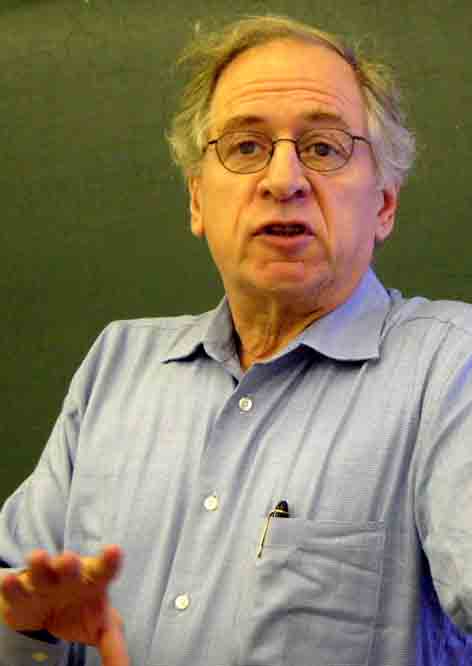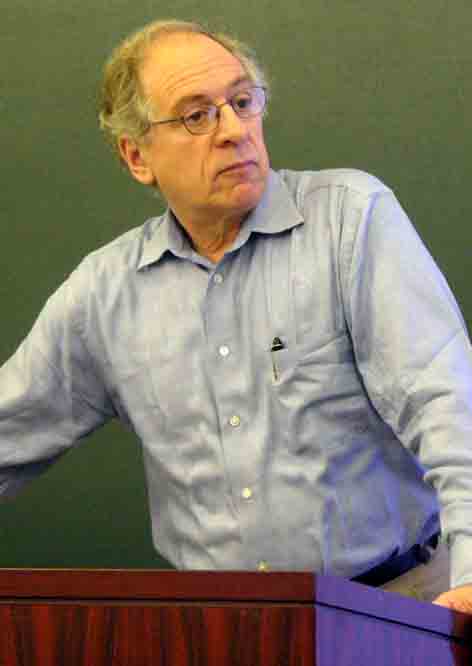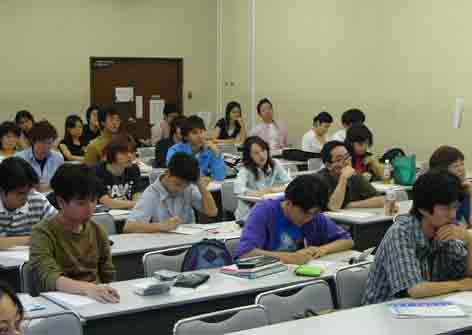トップページ > Events & Forums > 公共経済政策ワークショップ > 2004年度夏学期
公共経済政策ワークショップ
2004年6月18日 ミニ国際カンファレンス 「日本の政策課題と解決策」
「 変化しつつある政策決定の政治」 "The Changing Politics of Policy Making "
ジェリー・カーティス (コロンビア大学教授)
 第9回目の公共経済政策ワークショップでは、ミニ国際シンポジウムということで、まずジェリー・カーティス氏(コロンビア大学教授)が『変化しつつある政策決定の政治:The Changing Politics of Policy Making』というテーマで講演を行った。
第9回目の公共経済政策ワークショップでは、ミニ国際シンポジウムということで、まずジェリー・カーティス氏(コロンビア大学教授)が『変化しつつある政策決定の政治:The Changing Politics of Policy Making』というテーマで講演を行った。
物事が深く推敲されないまま、既定概念に囚われてしまいがちの世の中ではあるが、公共政策大学院の皆さんには常に問題意識を持ちながら学んで欲しい。90年代は日本にとって失われた10年と言われるが、これは必ずしも正しい認識ではなく、いろいろ変化が人々によって認識されにくい水面下で起きた時代である。例えば国防のように、国民による意識や組織の体制面で大きな変化を遂げたものもある。
重要なポイントは、政策の形成される過程が、90年代に大きく転換し、官僚主導による戦後の55年体制が崩壊したということだ。しかし、それまで日本の政治を決めてきた料亭の密室での会談といったようなインフォーマルなかたちでの政策立案(首相−自民党、自民党−財界、政府−マスコミといった関係)に取って代わる、その後の新しい体制が未だに作られていない。
宮沢や池田のように官僚から政治家になるというケースが少なくなった、自民党が官僚に持つ求心力が低下している今、今までの官僚と政治家との蜜月の関係も変わりつつある。かつては派閥により政治が動いたが、それももはや過去のものとなった。また財界から政治に求められるものも変わってきた。これは政治資金規正法によるところも大きい。唯一例外的に、インフォーマルな関係(記者クラブや番記者などの制度)が残っているのが、政府とマスコミの関係である。
 これからなされるべきは、ルールの明確化でないか。「マナーからルールへ」、いま千代田区では警視庁による、こういう建て看板がたくさん出されているが、これが日本的な「あ・うん」によるインフォーマルな合意形成が、ルールという形で、明文化されなくてはならなくなったことを象徴していると思う。今年の4月には80を超える公共政策や法科、そして会計の専門職大学院が開設されたことからも、時代が問題解決に新しいアプローチを求めていることは間違いない。
これからなされるべきは、ルールの明確化でないか。「マナーからルールへ」、いま千代田区では警視庁による、こういう建て看板がたくさん出されているが、これが日本的な「あ・うん」によるインフォーマルな合意形成が、ルールという形で、明文化されなくてはならなくなったことを象徴していると思う。今年の4月には80を超える公共政策や法科、そして会計の専門職大学院が開設されたことからも、時代が問題解決に新しいアプローチを求めていることは間違いない。
今後の参議院選挙でも、日本の政治が変わることは何もないだろう。しかし、その変わらないということが、まさしく「変わった」ことなのである。政治のことを考えるにあたり、物事を根本から、見つめ直して欲しい。特に、当たり前と思われていること、まだ起きていない未来のことこそ、諸君にはしっかりと見つめ直して欲しい。私は、政治とは、日本の社会的変化を示すインデックスだと思っている。
以下は後半で行われた質疑応答の一部である。

Q)何が55年体制を崩壊させたのか
A)多くの理由が考えられるが、競争の激化に伴い、今までのやり方が通じなくなってきたからだ。
Q)日本のジャーナリズムの質をどう考えるか。なにか不足しているものはあるか。
A)昨今のジャーナリズムは、日本であれ米国であれ、政府が主たる情報の提供者となっているために、「なぜそうなったのか」という分析の視点が重要だが、日本では本質的な話でない結果論ばかりに紙面が割かれている。日本の若いジャーナリストも、そういった現状に対して不満を持っていると思うが、変革のペースが遅々としていることに問題がある。
(以下原文)
Gerry Curtis, Professor of Columbia University
(He is also a visiting Professor of Seisaku Kenkyuu Daigakuin and currently living in Tokyo)
When learning, approach with a skeptical attitude towards conventional wisdom and don't take things for granted. There are lots of stereotypes, judging things without giving much thought. Approach with real sense of question.
'90s is often described as a decade of lost 10 years. But it isn't true. For example, it wasn't a lost decade in terms of defense. Japanese troops are now overseas executing peacekeeping missions. So many changes in '90s but those changes were largely below the surface.
Main point of this speech, is to point out that '90s formed a new basis for public policy making. "55-nen taisei" is disintegrated but new forms of policy making are not yet consolidated. What were the major characteristics of the past policy making system? Many think the major characteristic was that "everything run by bureaucrats"but that is not the key feature..
The key feature was a system of informal coordination among key elite groups (Prime Minister and LDP, LDP and "Zaikai", ruling party and the opposition, state and press.). This system of informal elite coordination is breaking down and no longer functions well. Informal coordination is means that important decision-making are made in non-transparent settings. It was based on close personal relationships between key actors. The relationship between bureaucrats and politicians is a good example. Former high ranking officials entered politics and coordinated with the bureaucrats. People like Ikeda, Sato, Miyazawa and others were formerly senior bureaucrats. Today young bureaucrats, not senior ones, run for public office. The nature of the relationship ahs changed. .
Factions and "Kokutai Seiji", the politics of collusion between the ruling and opposition parties, and close zaikai ties with politicians were at the heart of the policy making system. That is no longer the case. The zaikai has pluralistic interests, the opposition Democratic Party wants to take power and does not accept a position as a permanent opposition so kokutai seiji no longer functions as it once did. The one elite relationship that seems the least changed in that between the state and the press where there is far too much collusion.
What is needed now is a switch to a more "rule-based" system. This is happening in Japan and it is symbolized by signs put up by the police department around Chiyoda-ku in Tokyo which have the title From Manners to Rules. The signs warn people that it is against the law to throw empty bottles in the street, to smoke while walking and to discard cigarette butts on the street and so on. What used to be expected behavior is now legally regulated. The same is happening in all walks of social life in Japan . This year, more than 80 universities created Graduate Law Schools. There are new graduate schools to train certified public accounts, people for work in public policy making like this school, and even a few graduate schools of journalism. These developments are responses to the breakdown of the social system that underwrote the 55 taisei and are providing the basis for a new policy making system.
In the coming upper house election, almost nothing interesting is likely to happen. Day after election, nothing will change. The LDP and Komeito will still have a safe majority and Mr. Koizumi will still be Prime Minister. If the Democrats increase their seats as expected, the press will probably write that the election was a victory for the Democrats and a defeat for the LDP. Significance is insignificance. But the only party that can claim a victory in an election is the party that wins the most seats. This is a good example of the importance of thinking critically and not believing everything you read. When thinking of politics, always go back to fundamentals and question widely accepted stereotypes. Also remember that politics is interesting because it is a reflection of society, of the values and hopes and fears of the public. So studying politics is a way to get a window on social change in Japan .
